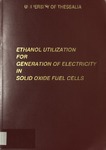Χρήση αιθανόλης για παραγωγή ηλεκτρικής ισχύος σε ηλεκτροχημικά στοιχεία καυσίμου
Ethanol utilization for generation of electricity in solid oxide fuel cells

Προβολή/
Συγγραφέας
Δουβαρτζίδης, Σάββας Λ.Όνομα μέλους επιτροπής
Βαγενάς, Κωνσταντίνος
Βερύκιος, Ξενοφών
Όνομα Επιβλέποντος
Τσιακάρας, Παναγιώτης Ε.
Ημερομηνία
2004Γλώσσα
en
Πρόσβαση
ελεύθερη
Επιτομή
This doctoral thesis presents new results and information on the utilization of ethanol as a fuel of solid electrolyte
electrochemical cells. By recognizing the importance of ethanol as one of the most representative alternative fuels, the
basic interest of this work is the examination of ethanol utilization for useful purposes (production of useful chemicals,
generation of electrical power etc.) in both electrolytic and galvanic processes in the field of solid state electrochemistry.
To meet this challenge, this work was undertaken paying attention in innovative research activities such as the
electrochemical promotion of catalysts and the development of the technology of fuel cells.
In a theoretical basis, the thesis in hand emphasizes on the thermodynamic analysis of electricity generation in solid
oxide fuel cells (SOFCs). A first approach, assumes various preliminary catalytic processes of ethanol decomposition
(steam reforming, dry reforming or partial oxidation) and the subsequent utilization of the decomposition products in a
dimensionless reversible SOFC stack. By selecting ethanol steam reforming as the most appropriate preliminary method
for SOFC operation, the analysis proceeds in a comparative study with other fuel options (natural gas, gasoline and
methanol) to clarify the expectations from the “ethanol scenario”. In a second approach, the analysis assumes an integrated
power plant comprised by the SOFC and auxiliary equipment (heat exchangers, mixers, burners etc.) and the term “exergy”
is introduced to justify design guidelines and optimization methods according to the second law of thermodynamics. As a
result, a design strategy is proposed taking into consideration the most important operation parameters, the fuel choice and
the plant topology.
Experimentally, the present thesis contributes three independent works on the utilization of ethanol in solid oxygenconducting
yttria stabilized zirconia (YSZ) electrochemical reactors. In the first of these works, the perovskite type catalyst
Lao.6Sro 4Coo.8Feo.2O3 is selected as a working electrode of an YSZ electrolytic cell fed by ethanol. In this work, the
preparation and characterization of the catalyst is described and its activity for direct ethanol oxidation is examined. During
closed circuit experiments, the mechanism of the reaction revealed purely electrocatalytic response in contrast to the
second experimental work of this thesis were the electrochemical promotion of platinum (Pt) catalysts is examined in a
similar YSZ reactor. In this work, it is proved that the catalytic rate of ethanol oxidation may be significantly promoted
through electrochemical pumping of 02‘ anions to the working Pt electrode. By application of currents equal to 20 - 80 μΑ,
it is observed that the activation energy of ethanol oxidation may lower up to 70% with respect to the open circuit catalytic
value. This phenomenon is described according to the theory of “Non-Faradaic electrochemical modification of catalytic
activity” (NEMCA) and is found of significance for the enhancement of the selectivity of the reaction for the production of
acetaldehyde. Finally, the last experimental work of this thesis reports preliminary results of ethanol utilization in a tubular
SOFC prototype with a Pt anode electrode. In this work, the SOFC is fueled by a H2+CO+CH4 gaseous mixture taken by
external ethanol reforming and two regimes of operation are recognized depending on temperature. In the first low
temperature (660°C) regime, complete oxidation of the gaseous mixture is observed implying the ability for effective
power generation. In higher temperatures (800°C), however, the reaction mechanism is found most appropriate for the
production of synthesis gas (H2 + CO).
Ακαδημαϊκός Εκδότης
Πανεπιστήμιο Θεσσαλίας. Πολυτεχνική Σχολή. Τμήμα Μηχανολόγων Μηχανικών Βιομηχανίας.


